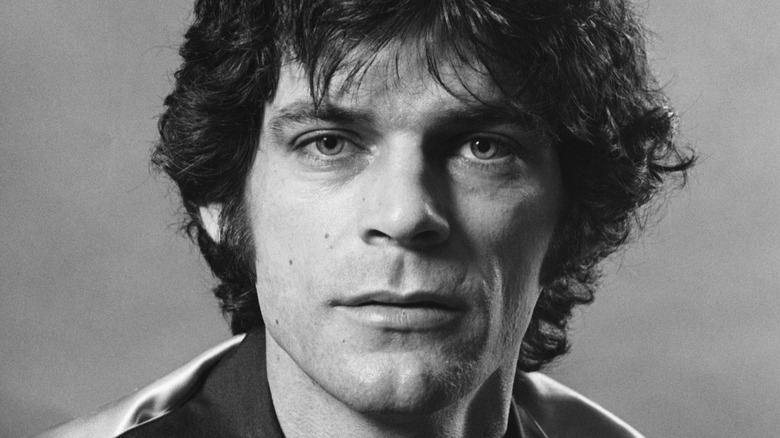B.J. Thomas' Cause Of Death Explained
Five-time Grammy winner and classic pop sensation B.J. Thomas has died. Jeremy Westby, a representative of 2911 Media and Thomas' publicist, confirmed Thomas' death in a press release. According to the release, Thomas died on May 29, 2021, in Arlington Texas. The singer succumbed to complications arising from lung cancer. Fans have only known about Thomas' lung cancer since March, according to CBS News.
B.J. Thomas, born Billy Joe Thomas, is best known for his song "Raindrops Keep Falling on My Head." The song topped the charts after it was included in the movie "Butch Cassidy and the Sundance Kid" in 1969. Its use in the movie led to an Academy Award for best original song in 1970 and an induction into the Grammy Hall of Fame in 2014 (via The New York Times). Thomas shared these honors with Burt Bacharach and Hal David, the duo who wrote the song, though Thomas' vocals are undoubtedly part of what made the song a classic.
Thomas' vocals were truly what set him apart in the 1960s and '70s. He is known as one of the people who brought a soft, southern style to pop music. Thomas was Oklahoma-born and Texas-raised, but he credited his vocal style more to other artists than anything else. In his memoir, "Home Where I Belong," Thomas wrote that he credited singers Jackie Wilson and Little Richard with inspiring him to make the most of his music. It was an inspiration that would take Thomas to amazing heights.
Inspiration through struggle
Even when other singers covered B.J. Thomas' songs, their widespread appeal would hold (via The New York Times). "Hooked on a Feeling" is the most popular example. Most people today are familiar with the Blue Swede version released in 1974 (and later featured on the "Guardians of the Galaxy" soundtrack). But Thomas originally released the song in 1968 to widespread acclaim.
However, Thomas didn't just top the charts. He worked with some of the biggest celebrities at the time and even sang at Elvis Presley's memorial service in 1977. The performance was likely bittersweet. Not only had Presley been another singer that influenced Thomas, but his death had been connected to repeated and prolonged substance abuse. By the time Presley died, Thomas had only recently gotten clean and sober, per The New York Times.
In 2020, Thomas appeared on "The Debby Campbell Goodtime Show" and admitted that he hit rock bottom in 1976 (via CBS News). Thomas had struggled with an addiction to both pills and alcohol since the early days of his recording career when a producer told him to take amphetamines for the energy boost.
Causes of lung cancer
Excessive alcohol use has been linked to an increased risk for several types of cancer. These include the voice box or larynx as well as the mouth and throat. The liver, rectum, and colon are also at risk, and women suffer an increased risk of breast cancer, according to the CDC. There is some evidence that it can also impact the lungs. A 2018 report published in Revue de Maladies Respiratoires, a French medical journal focused on respiratory issues, stated that unhealthy alcohol use is known to lead to pulmonary issues and may be linked to lung cancer. Pulmonary issues refer to blockages in the arteries of the lungs and are a common facet of lung cancer.
"I used to smoke in my thirties, and I drank back then," B.J. Thomas revealed at a concert benefiting the Cystic Fibrosis Foundation in August 2020 (via Press Pros). Cigarettes, now commonly known to put people at incredibly high risk of developing lung cancer, were common features of social gatherings in the '60s and '70s. The Mayo Clinic revealed that smokers and those exposed to secondhand smoke are at a greater risk for lung cancer because the carcinogens in cigarettes change the cells that line the walls of our lungs. Our bodies heal after each exposure but when the cells are regularly affected, our bodies can't keep up. This can eventually lead to cancer-causing cellular mutations.
Symptoms of lung cancer
It takes time for mutated cells to become cancerous and then longer still to reach the more aggressive stages. The American Cancer Society says that if caught in the early stages, it is possible to cure lung cancer. If the disease progresses, however, it is largely incurable. As a 2008 report in the Seminars in Respiratory and Critical Care Medicine explained, treatments are meant to extend the patient's life expectancy or increase their quality of life rather than to cure once cancer reaches a certain point.
This is especially true of elderly patients who, according to the CDC, make up the majority of lung cancer cases each year. These are the patients who are also most likely to experience complications, according to the Seminars paper. And the source of these complications can be hard to track, especially because many of them mimic symptoms of both the disease and the treatments for it.
Lung cancer can present with several symptoms ranging from the easily overlooked to the shocking. Common symptoms can include chest pain, shortness of breath, headaches, and bone pain as well as hoarseness to the voice, according to the Mayo Clinic. More severe symptoms include unexplained weight loss and a persistent cough that may produce blood.
Complications of lung cancer
As Cancer Network, home of the medical journal Oncology, explained, cancer patients are at a higher risk for infection than most people. Both cancer and its treatment options tend to suppress the immune system, opening the patient up for outside infection. And according to the Mayo Clinic, cancer cells produce a protein that allows them to "hide" from the body's immune system, allowing them to do their damage uninterrupted. It is this one-two punch that often leads to the loss of a patient through complications.
Some treatment options actually target this ability. Termed "immunotherapy", it is described by the Mayo Clinic as a method by which to turn off the ability of cancer cells to hide from the body's immune system. Other treatment options are a bit more aggressive and some, like radiation therapy and chemotherapy, can lead to specific complications.
These include shortness of breath and a continued cough that may produce blood. Other treatments, like surgical removal of infected sections of the lung, can also reduce lung function but may prevent the cancer from spreading, a complication known as metastasis.
The legacy of B.J. Thomas
Fans may never know the specific cause or causes of B.J. Thomas' lung cancer. Doctors struggle to identify specific causes and pinpoint complications that arise from the disease. But rather than remember him for his cancer diagnosis, his family is likely to remember the joy he put into the world. He is survived by his wife, Gloria Richardson Thomas, their three daughters, and four grandchildren (via The New York Times). And almost to the very end of his life, Thomas continued to make music that he hoped would inspire people.
He toured throughout his life, right up into the early 2000s. And prior to the pandemic, he had planned to record in Muscle Shoals, Alabama, according to CBS News. Throughout his career, he won not only five Grammys but also two Dove awards for his work in Christian and Gospel music. His career spanned more than 50 years and crossed from one millennium to another, leaving behind an enduring legacy of talent and inspiration.






